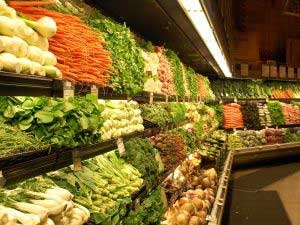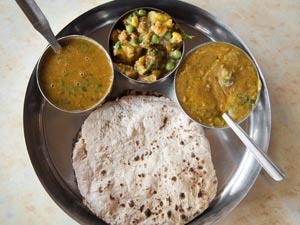Photographs: Courtesy LifeMojo.com Courtesy LifeMojo.com
With vegetarianism being more of a cultural and religious choice in India, we do not pay heed to our diet and fall prey to many disorders associated with non-vegetarianism. Here's how to ensure that your meals are well-balanced, even if you abstain from meat.
For reasons of health, or conscience, or religion, or simply preference, vegetarianism is becoming increasingly popular. And it's easy to be vegetarian these days, with so many meatless food products in the market, along with all kinds of vegetarian cookbooks and magazines.
Certainly, being vegetarian is a boon if one eats a healthy, rich diet but a bane if one pays no heed to what s/he is eating. Vegetarians are not exclusive to our country, but there remains a remarkable difference between vegetarians in India and those overseas. People abroad usually become vegetarian for philosophical and/or health reasons and are therefore careful that their new diet is nutritionally adequate and healthy. In India, being predominantly vegetarian for generations, we do not pay heed to our diets, which is why despite being vegetarian, we suffer from all those disorders associated with a non-vegetarian diet.
is one of the most trusted sources of information about good health and wellness. To those who want to manage their health themselves, LifeMojo provides necessary information, tips, tracking tools and support to help them stay informed and motivated.
Convenient vegetarian foods can be just as fattening as non-vegetarian foods
Photographs: Courtesy LifeMojo.com
An unbalanced non-veg diet is associated with heart disease, cholesterol problems, high blood pressure, cancer and obesity, while a vegan diet is supposed to counter these maladies. But the paradox is that an unbalanced pure vegetarian diet can lead to exactly the same ailments!
Convenient vegetarian foods can be just as fattening as non-vegetarian foods. In fact, some vegetarian products and recipes may contain more fat than meat-based foods. Over-consumption of these high-calorie convenience foods or vegetarian fast-foods leads to weight gain just like meat-based foods.
Nutrition tips that will balance your vegetarian diet
Photographs: Courtesy LifeMojo.com
Vegetarian diets were once thought to be lacking in certain nutrients. But with a little planning, vegetarians can easily meet all their nutritional needs. Here are some nutrition tips that will balance your vegetarian diet:
- A vegetarian diet usually contains a lot of dal (pulses). Individually, dals have only a 30 percent protein content and some missing amino acids. To compensate, add tofu as it is partially fermented and therefore has better digestibility, and also is a complete protein. Besides, one must eat a variety of dals to increase the number of nutrients in their diet.
- Vegetarian diets are deficient in Vitamin B-12, which is found mostly in animal-based products like milk, eggs, chicken, fish, meat etc. To compensate its deficiency, one has three options: Nutritional yeast (like in marmite). One can also eat seaweed, spirulina etc. And the last option is to take a multivitamin supplement containing B complex.
Calcium, folic acid, iron and more
Photographs: Courtesy LifeMojo.com
- Vegetarian diets must contain foods rich in calcium. For people who are lactose-intolerant, the best bets are soya, turnips, broccoli, collard greens, bok choy (Chinese greens), ragi etc. For people who consume dairy products, milk, curd, cheese and paneer are sufficient.
- Omega 3 fatty acids found in soya oil and flaxseed oil are beneficial to vegetarians and contain essential fatty acids which are important for the body.
- Folic acid is an important aspect of the diet and especially necessary for pregnant and lactating mothers. Lots of fruits, vegetables and whole grain cereals contribute the best.
- Iron levels are usually found to be low in Indian women. This is because of an incomplete diet. The best alternatives are kamal kakdi (lotus stem), raisins, green leafy vegetables etc. Vitamin C adds to the iron absorption, so have a lot of citrus fruits. However, do not combine iron-rich foods with dairy products like paneer, as this leads to nutrient loss.
The key to a healthy vegetarian diet is careful planning
Photographs: Courtesy LifeMojo.com
A healthy vegetarian diet simply means eating a variety of nutritious plant foods and meat substitutes. It can provide all of the vitamins and minerals, as well as calories and protein that are needed by the body.
The key to a healthy vegetarian diet is careful planning, to assure balance and nutritional adequacy. If you're choosing a vegetarian way of life, the most important thing you can do is educate yourself. The Internet is full of delicious nutritional recipes for non-meat eaters. Take advantage!






Comment
article